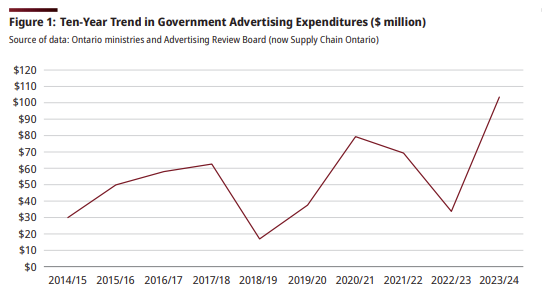The Ford government has spent more than any other previous administration in any other year on advertisements which, the auditor general has found, were “designed to promote the governing party.”

Auditor General Shelley Spence found as part of her annual report that, in the fiscal year ending at the end of March, the province spent a total of $103.5 million on advertising.
That is the most any Ontario government has ever spent on advertising in a single year, the auditor general said, and triple what was spent the year before.
The two biggest campaigns run over the past year focused on Ontario’s economy and were worth roughly 65 per cent of all government advertising last year.
The auditor general found the advertisements were compliant with current legislation but would have broken partisanship rules abolished in 2014.
“In the old act, ‘partisan’ was much more defined,” Spence said.
“So partisanship would have included that ads shouldn’t have a statement like some of them do… is the ad providing information? Is the ad providing education? And in the ads that we outlined, it really was just fostering a positive view of the governing party without providing other information that most ads would have.”

The former Liberal government changed those rules in 2015 and despite promising during the 2018 election to undo the changes, the Progressive Conservatives decided to stick with them after they formed government.

Get breaking National news
Prior to 2015, ads were banned as partisan if the intent was to foster a positive impression of government or a negative impression of its critics, but the then-Liberal government amended the rules.
Now, the auditor general can only veto an ad as partisan if it uses an elected member’s picture, name or voice, the colour or logo associated with the political party or direct criticism of a party or member of the legislature.
Spence said that one advertisement claims “more people are working than ever before” in Ontario — a statement she said wasn’t backed up or informative.
“It’s a blanket statement without really anything behind it,” Spence explained.

Finance Minister Peter Bethlenlfavy said the government was “following the rules” and defended the spending on Wednesday.
“We’re very proud of what we’re doing in Ontario,” the finance minister said. “We’re telling that story to our American friends, it’s so critical. And what we’re doing is of course improving the economy… and those ads really help.”
Bethlenfalvy said the advertisements promoted the government which “is the people of Ontario” and that they were not “shameless at all.”
“I’m very proud that we’re able to tell the important (stories) for the priorities for the people of Ontario,” he said.
The auditor general’s annual advertising report looked at government advertisements that have been playing through hockey games, the Super Bowl and news bulletins over the past year. The government had refused to disclose how much had been spent on them.
“We assessed their primary purpose as promoting the governing party,” the report said. “Under the original Act, these advertisements would not have been approved by our Office.”
Opposition critics, who have long decried the government’s advertising campaigns as a waste of public money, jumped on the finding.
Ontario NDP Leader Marit Stiles said spending public money on the advertisements was “shocking” and “outrageous”
Bonnie Crombie, Liberal leader, claimed the Ford government was using taxpayer dollars to improve its standing ahead of a rumoured early election.
“Doug Ford is using government money to seek power for power’s sake, ignoring that you don’t have a family doctor and that he never delivered the tax cut he promised you six years ago,” Crombie said in a statement.
The amounts spent on government advertising generally follow a pattern, peaking in the year before a provincial election, Spence wrote in her report.
The money the government is set to spend on advertisements is likely to grow after the province unveiled an advertisement targeting the U.S. in the wake of recent tariff threats at the beginning of the week.
— with files from The Canadian Press
Editor’s note: A previous version of this story said the government had spent $104.6 million on advertising last year. That figure has been corrected to $103.5








Comments
Want to discuss? Please read our Commenting Policy first.